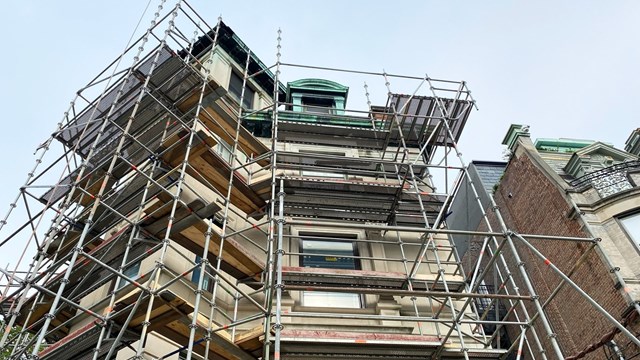For any co-op or condo in New York, there are certain types of insurance that they cannot live without. Generally those include: property, liability, umbrella, D&O (with employment practices liability (EPL) insurance embedded in the coverage), fidelity, equipment breakdown coverage or more commonly called boiler and machinery (B&M), workers compensation, disability coverage, and when applicable, environmental coverage.
“If you have the basic 8 or 9 (environmental only if you have the exposure) coverages, then there is no redundancy. It is always a balance of having proper coverage with the broadest terms and conditions at the most efficient cost for the coverages you need,” says Todd Ross, president of Manhattan-based TM Ross Insurance Brokerage, LLC. “With insurance you only know what you have purchased after a loss, and the worst time to find out what you have and don’t with insurance coverage is after the loss.”
Ed Mackoul, president of Mackoul & Associates, Inc., which has offices in New York City, Long Island, New Jersey and Florida, believes that New Yorkers need to pay particular attention to having enough of equipment breakdown insurance or B&M, which will cover all the machinery in the building in case of a mechanical breakdown.
New York State of Mind
“There are differences between New York and Iowa because we are a much more litigious state,” Mackoul says. “Directors & Officers liability becomes more important here because statistics show that 70 percent of all D&O claims are lodged in five states (New York, New Jersey, Texas, California and Florida).”
Outside of major cities, not everyone is thinking about terrorism, but that’s an insurance issue that co-ops and condos in New York need to think about. “A lot of these buildings will have to pay extra for terrorism coverage and rates tend to be higher here than other states, where it’s not on everyone’s mind,” Mackoul says. “Before 9/11 no one thought about it, but then insurance companies started excluding it but now they can either include it or charge extra for it.”
Also, since a good part of Manhattan island is in an area that is classified as a flood hazard area, if there’s flood damage, you need to have a flood policy in place. MariAnn Cole, president of Long Island Coverage Corp. in Hauppauge advises that not only water damage but storm force winds are also something to think about. “Wind is a big issue,” Cole says. “Most carriers are offering it but putting in a higher deductible. Then there’s ordinance of law, demolition, debris removal, they are all enhancement extras that could be bought.”
Barbara Grimaldi of Allstate Insurance says that the homeowner should be aware of not only their own insurance coverage but their building as well. "For individual homeowners, what they should really do, as owning a condo puts you in a unique position—unique because both the common and individual insurance needs are similar. The condominium association has insurance policies on the common areas like the building, the exterior, and the walkways. But you're still responsible for insuring your interests such as your personal property and yourself from a liability, your guests, and your own medical protection. In other words, if you are the owner of the condo or a co-op, it behooves you to find out what your condo association or co-op board has on their master policy and what they're responsible for," adds Grimaldi.
Grimaldi described three main components of what needs to be insured. "You take the apartment, you shake it upside down. What falls out is your personal property; what stays up there from the four walls in, and the ceiling and the four walls in, is your building's property or improvements and betterments, and naturally it's your liability. So the main building itself—the master policy—would cover you up to based off your bylaws or proprietary lease, or your house rules up to the four walls, and from the four walls in, usually it's the owner of the apartment." So, anything inside the walls of the apartment normally falls to the responsibility of the shareholder and outside the walls falls to the building.
Some insurances you cannot do without, says Michael Zeldes, a senior vice president with HUB International Northeast, are employee dishonesty bond or fidelity insurance, environmental insurance for protection against various hazards and pollutants, and employment practices liability, which includes employees and any other third party person or persons. This coverage, says Zeldes, protects against sexual harassment, discrimination, wrongful termination as well as other alleged employment related suits. The third party policy wording extends the typical employee policy to any third party which of course includes unit owners, visitors, etc.
Enough or Not
When deciding on insurance needs, a condo or co-op should think about more than deciding what is adequate and affordable coverage. There are those buildings that try to do the bare minimum and even scale back their insurance from time to time because the board members think that they won’t need certain types of insurance, says Ross.
Ross says that the umbrella limit can be debated in New York City, with $50 million to $100 million in umbrella limits common, and some buildings choosing to go up to $200 million.
Grimaldi figures replacement costs this way by starting with the market value of one's apartment. "It doesn't necessarily mean it's gonna cost me $2 million to repair or replace that shell of that apartment. So you need to know how much it's gonna cost to repair and replace just the apartment. There's usually three criteria that I go by to at least assist or help potential insurers to figure out the dollar amount that they need. It's either by the square footage of the apartment—just take the square foot and at least multiply it by at least $200-$300 per square foot, because that's what the going rate is for a contractor to come in and repair it or replace. But that's also based off of what the building is responsible for."
If a building was to skimp on their insurance coverage, major problems could develop. “Having a totally uncovered loss, or partially uncovered loss, any of these potentials mean that the direct assets of the co-op/condo are exposed,” Ross says. “That indirectly means the unit owners are responsible for paying the loss if no insurance exists or there is excess liabilities over and above the insurance that is in place.”
When assessing the needs, a board should consider a number of things, including preparing for the possibility of cases like discrimination or wrongful termination of employers, which may not be covered in their standard policy.
“Another thing is if they don’t insure the building up to the value of their building, there’s something called co-insurance, where the insurance company may no pay the full claim,” Mackoul says. “They underinsure the building and they get penalized with their claims.”
Determining how much coverage is enough is a complex process, says Grimaldi. "They actually have to sit down and have the risk underwriter for that insurance company come in and look at the building, look at the safety features of the building, look at what they really want to protect. Liability is a big number for me. I make sure the building has enough liability to cover in the event something should happen and they're negligent that they have the ample amount of coverage," and that coverage is not going to deplete the escrow account they typically have set up.
Residents' Responsibility
For the record, most homeowners don’t know the extent of coverage that their building has, and the board doesn’t have any responsibility to let them know. Still, it shouldn’t stop owners from asking. When a resident is aware of what would happen in emergency situations, they can better protect themselves with individual policies of their own.
Ross recommends reviewing and updating the bylaws and offering documents so that unit owners are responsible for property and liability that is not considered common property or common elements.
Some unit owners will buy just what the board requires them to get, while others will insure for the worst possible scenario. Still others may not realize that they will be responsible if something happens.
“Only unit owners know how much property insurance they should have on their ‘property’ but for liability insurance the co-op or condo should require at a minimum $500,000 in liability limits,” Ross says.
Many residents think that because the building has purchased insurance on the condo, they don't need insurance to protect their home. Not true.
For condo owners, individual owners should carry an HO6, also known as a condominium unit owner’s policy. With condo insurance, damage to improvements, additions and alterations of your unit are covered. Your condo insurance policy also covers your belongings and the structural parts of the building that you own.
“It also covers things outside the building, so if they are playing in the park and they hit someone with a bat, or their dog bites someone, personal liability covers that,” Mackoul says.
“The typical cooperative is responsible for every portion of the building except that which is specified to be the obligation of the shareholder,” says Marcie Waterman Murray, of the law firm of Deutsch Tane Waterman & Wurtzel. “The typical condo is responsible for those building portions designated as common elements (roof, building walls, elevators, public hallways) depending on the language in the declaration.”
Common elements may also include apartment windows and apartment entrance doors, and all of this should be clearly laid out in the bylaws or governing documents of the building.
Staying Abreast
Buildings don’t normally grow, but what does is how much it costs to replace a building so it’s really the limits that can change over time. “As a building gets older, some insurance companies offer inflation guards that may increase 2-8 percent every year,” Mackoul says. “But the coverages never change unless requested.”
An insurance broker will look at your total square footage, look at the value of your building and tell you if you are in the low end or high end but only appraisers can determine if a building has adequate coverage.
According to Ross, there are a number of mistakes that a board or shareholders make when considering their insurance options.
And says Zeldes, it's important not to scrimp on insurance, especially in such trying economic times. "One common mistake that boards or managers make is taking the lowest bid without understanding the inadequacies of the coverage they are purchasing," Zeldes explained. "In these times particularly, boards feel the need to cut every expense and insurance costs seem like an item to save on. This can be devastating to a co-op or condo. Just look at the real life example from several years back when a co-op in East Harlem with only a few million in general liability and umbrella limits had the unthinkable happen. A piece of debris fell off of the roof, hitting a man walking by. The man’s hand/arm was injured severely. The man made a claim for over $10,000,000. Not only was this a tragedy for the young man, but the co-op was caught underinsured. The young man was a professional musician and the injury left him unable to play his instrument for the foreseeable future. Not only did the board suffer a claim that settled far above the policy limits, but the claimant fought and won the right to sue the board members personally. The lesson: have an expert agent/broker in co-op and condo coverage evaluate your limits and coverage before counting the dollars in savings that the newly proposed coverage offers."
The bottom line is simple. Industry experts recommend comparing carriers and finding one that offers the best general policy. Also, check for better rates every few years—because standing still with one company may keep you missing out on savings.
Keith Loria is a freelance writer for The Cooperator and other publications.










Leave a Comment